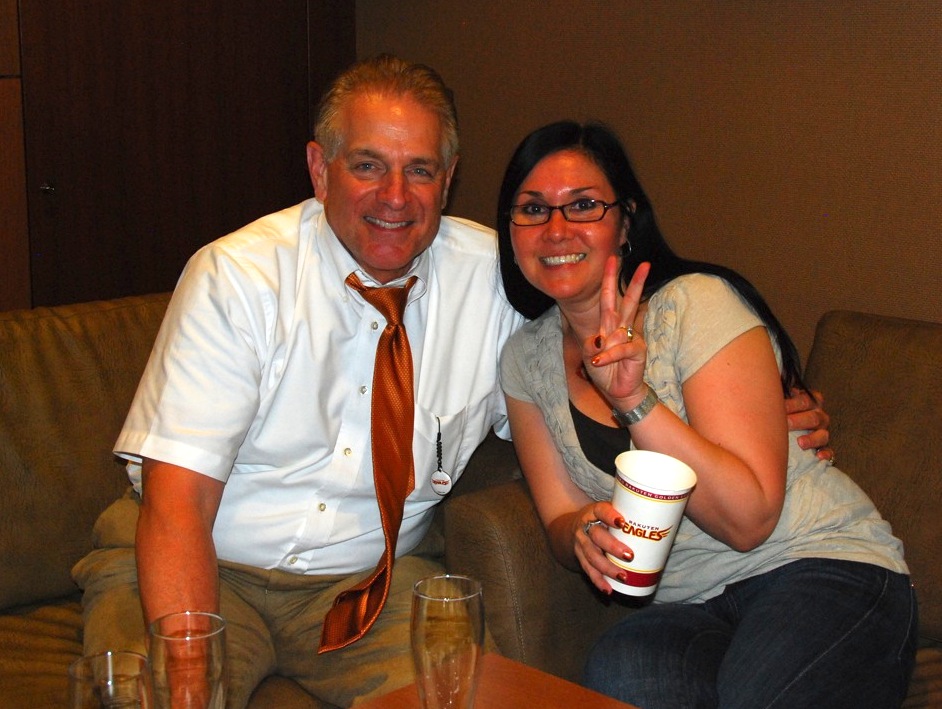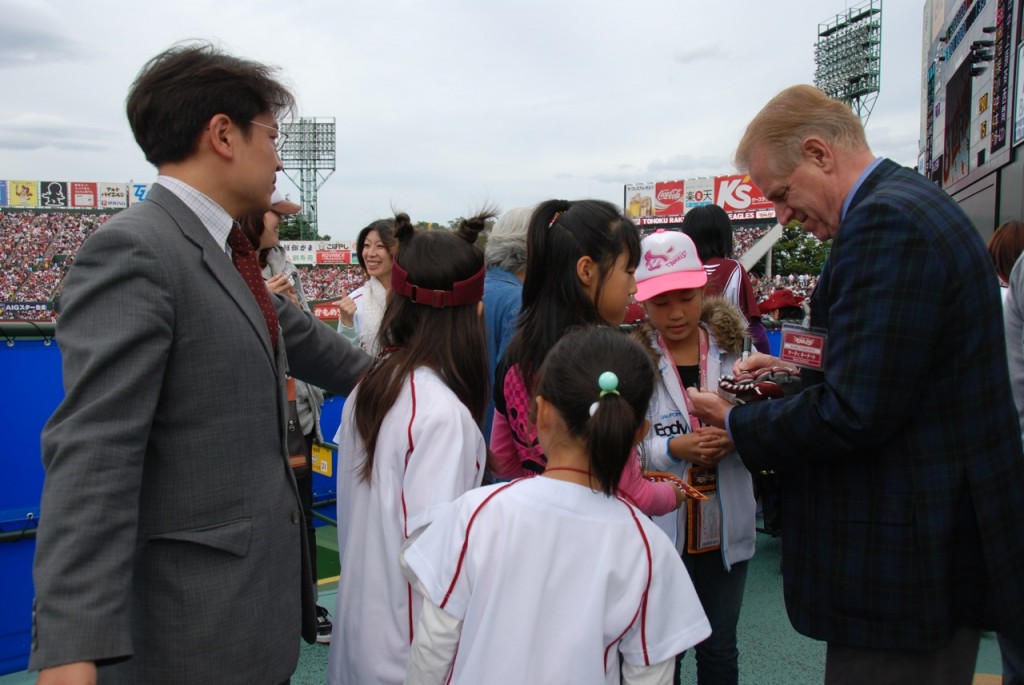
“Everything with Japan started in the toilet.”
When Marty Kuehnert speaks of the serendipitous event that led to his first trip to Japan, that’s usually how he begins. “Spend the summer in Japan!” the flyer above the urinal beckoned. Kuehnert, then a freshman at Stanford, noticed the sign while he was, er, in the toilet and was intrigued. The next thing he knew, he was celebrating his 19th birthday in Japan.

Forty-five years later, Kuehnert still calls Japan home, where he is the senior advisor to the Rakuten Golden Eagles of Nippon Professional Baseball, a professor at and the vice president of Sendai University, and the founder and president of International Sports Management and Consultants. From his first experience in the Far East to his current activities, Kuehnert held several jobs in Japanese baseball and dabbled in everything from sports licensing to sports media along the way.
Kuehnert’s route to Japan may have begun in the men’s room on the campus of Stanford University, but his interest in Asian culture began much earlier. When Kuehnert was in elementary school in his native Los Angeles, his parents sponsored a Chinese family through their church, and the two families became close. “I had an affinity for coming to Asia, I think, because of that association with that one family in church,” Kuehnert says from his home in Sendai, a city north of Tokyo.
That affinity stuck with him years later when it came time to apply to colleges. He chose to attend Stanford on the basis of three categories: The strength of its academics, a partial baseball scholarship (he was a catcher), and the reputation of its foreign exchange program. Little did he know during his 60-day stay as an exchange student at Keio University in Tokyo that he would later become the first foreigner to be named general manager of a Japanese professional baseball team.
After Kuehnert spent his senior year of college in Tokyo and received his Stanford diploma in the mail, he stayed in Japan through 1970 and worked at the World’s Fair in Osaka as an interpreter/guide in the United States pavilion. “I was kind of the unofficial sports representative when athletes came through,” Kuehnert says. In addition to giving sumo wrestlers guided tours through the pavilion, Kuehnert met members of the San Francisco Giants, including reigning National League MVP Willie McCovey, superstar Willie Mays, and a young Bobby Bonds. Kuehnert also had the good fortune of meeting the legendary Cappy Harada, a nisei (2nd generation Japanese American) who was a longtime assistant to the San Francisco Giants and instrumental in US-Japan relations through the sport of baseball.

That association with Harada proved to be auspicious. In 1972, during the first of his two stints back in the US, Kuehnert was “flipping burgers at my friend’s father’s place” and on the waiting list of Stanford’s MBA program when he received a call from Harada, asking him to become general manager of the Lodi (CA) Orions, a team in the Class A California League and the first Japanese-owned professional franchise in North America. The 25-year-old, who originally wanted to earn a business degree and use it to bridge Japanese and American sports, took the job. He ran the club for two seasons, during which time he was named the 1973 California League Executive of the Year.
Fifteen years passed before Kuehnert lived in the States again. This time he reigned as president of the Birmingham Barons from 1990 until 1991 and was part owner from 1990 until 1995. While Kuehnert was with the Alabama-based affiliate of the Chicago White Sox, he witnessed Bo Jackson attempt a comeback and Michael Jordan attempt a career change.
The lure of Japan kept calling him back, however, and because of Kuehnert’s ongoing projects, he never really left. After he ran the Lodi Orions, he took a front office job with the Taiheiyo Club Lions in Fukuoka as the director of sales and promotions in 1974. He did licensing for an Osaka-based sportswear company, introduced Easton’s metal bats to Japan, wrote seven books, was a sports journalist for major Japanese newspapers, had his own TV show, and acquainted Japan with the concept of sports bars in Kobe (a venture that ended after the Great Hanshin earthquake in 1995).
Kuehnert’s resume impressed Hiroshi Mikitani, the founder of Rakuten, the most successful online shopping site in Japan. In 2004 Mikitani sought out Kuehnert for sports management advice for his floundering soccer team. During the meeting Kuehnert joked to the billionaire, “Mr. Mikitani, if this [were] a baseball team and not a soccer team, I’d love to join you and help run it.” A few months later, Mikitani called Kuehnert with the news that he was vying for an expansion team in NPB and wanted Kuehnert to be the general manager. After reading Kuehnert’s books, Mikitani felt the American’s no-nonsense style would be the right fit for his new club, if he won the bid. In November 2004, Mikitani was indeed awarded a franchise, and Kuehnert became the general manager of the Tohoku Rakuten Golden Eagles. It didn’t take Mikitani long to grow impatient; he demoted Kuehnert from GM to assistant to the president only one month into the Golden Eagles’ inaugural season.
Now a senior advisor to the ballclub, Kuehnert is still a popular figure in Sendai. These days his main job is with Sendai University, a school that focuses on preparing students to become coaches. “It’s a university that is basically to train coaches for high schools, elementary schools, PE instructors, really,” says Kuehnert, who is the school’s vice president. Kuehnert also teaches sports management and sports media classes at Sendai University and at the prestigious Tohoku University.
Despite his busy teaching schedule, he remains active with the Golden Eagles and vocal about baseball inside and outside of Japan. In October of last year he wrote a passionate and informed missive in response to a reporter’s criticism of Ichiro Suzuki’s record-breaking achievements in MLB (When the newspaper didn’t print Kuehnert’s rebuttal, I posted it on my blog).
Throughout four decades Marty Kuehnert became fully ensconced in the culture of his adopted land, but without losing his own voice and compromising his principles. As a result he established his own business, built his own brand, and made a difference in Japanese baseball. “What’s happened to me in Japan is . . . an interesting life,” says Kuehnert. Not bad for a guy whose life in Japan began in the toilet.



Marty and Muyki
We hope you are OK over there. Heard you on ABC this morning. Email if you can [email protected]
God bless!
Jeff and Liz